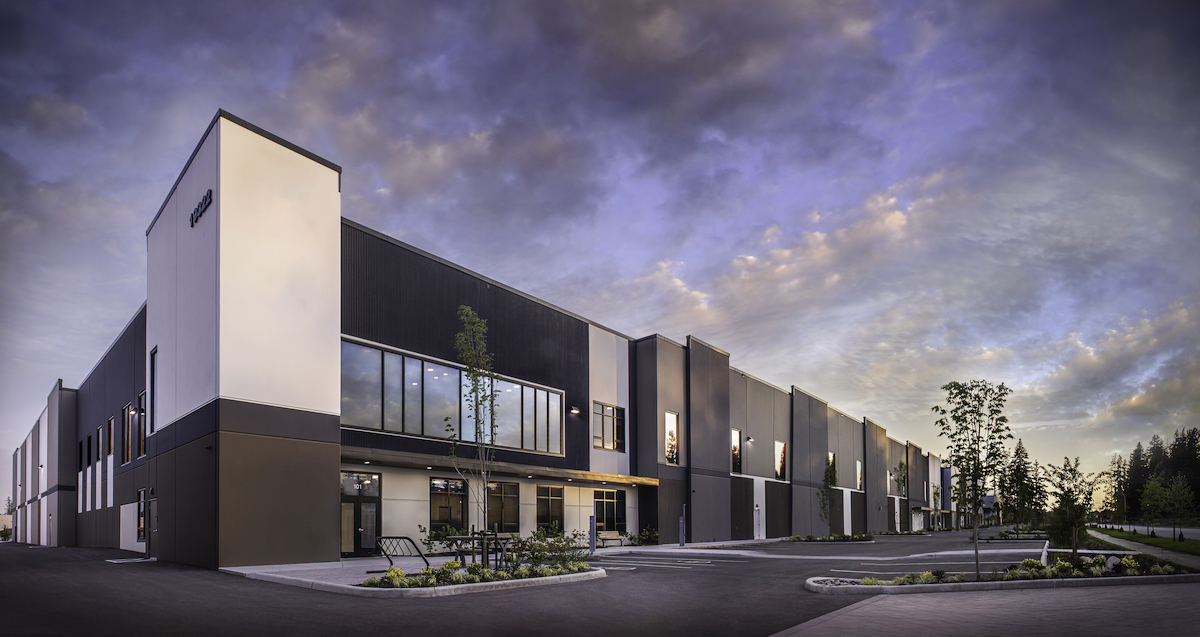Q&A: Prism CEO Omar Rawji celebrates $2B milestone
Learn about B.C. construction trends and Rawji’s keys to success.

From transforming self-storage facilities into cutting-edge, multi-story solutions to navigating the complexities of the COVID-19 pandemic, Prism Construction’s journey reflects resilience and adaptability. We caught up with Omar Rawji, who took the helm as CEO in 2022 after over a decade with the company. He shared insights into Prism’s keys to success, emerging trends in construction, and the opportunities shaping B.C.’s building landscape.
SiteNews:With a decade and $2 billion in construction under your belt at Prism, tell me about the growth you have seen during your time leading the team.
Omar Rawji: Since becoming CEO in 2022, and during my time as VP starting in 2011, I’ve watched Prism grow steadily—not only in the scale of the projects we handle but also in the variety of markets we serve.
While we’re based in the Lower Mainland, we have worked in nearly every major city across Canada. No matter the location, our approach has remained consistent: staying true to our design-build philosophy, prioritizing quality and keeping our commitments to our clients.
Over the past decade, we’ve consistently tackled large, multi-million dollar projects, with 60% of our business coming from repeat clients. Hayden Drilling is a great example—a long-term partner who has trusted us with three major projects since 2008, including our most recent development on #5 Road in Richmond.
These enduring partnerships are a testament to the trust we’ve built over the years and continue to drive our growth.
Another significant contribution to the construction landscape: Prism pushed the evolution of mini storage buildings, transforming them from single-story, drive-up buildings to advanced, multi-story, climate-controlled structures.
Our self-storage projects have set a new standard in the industry, enhancing the functionality and security of these spaces while meeting the rising demand for flexible, high-quality storage solutions. We’re proud of the impact we’ve made in this sector and the lasting improvements we’ve helped bring to the design and use of self storage facilities.
One of the greatest challenges I’ve faced as CEO has been navigating the effects of COVID-19 from the rush of economic activity to subsequent slowdown. The pandemic disrupted the labor market in ways no one could have predicted and the construction industry faced rapid increases in pricing and material costs.
In response, we had to adapt quickly—working closely with our suppliers to secure materials and manage costs effectively while maintaining our commitment to pricing and quality. We prioritized flexibility and transparency with clients, keeping them informed and working together to manage expectations during these unpredictable times.
Overall, the growth I’ve seen at Prism is a result of our expertise, built up through decades of experience.
What would you say are some of your biggest keys to success?
Some of our biggest keys to success are rooted in a few key practices.
First, we prioritize reliable and realistic budgets from the outset, and we have a longstanding track record of keeping promises to our clients—three decades of successful projects and repeat clientele are proof of this.

We also focus on training top talent from within, ensuring our team consists of experts who are among the best in the field. Their knowledge and commitment to excellence are key to delivering high-quality results.
Finally, we emphasize open communication and proactive problem-solving, which allows us to address challenges swiftly and effectively.
Where do you see the biggest opportunities in B.C. for builders?
B.C. is a dynamic market with several promising opportunities for builders. The biggest areas I see are:
- Affordable Housing: As housing prices continue to rise, there’s a significant need for more market and below-market housing options. Builders who can deliver cost-effective, high-quality residential projects will not only help address this urgent need but also secure long-term growth opportunities. Government initiatives to support affordable housing are expected to increase, making this a high-impact area for builders who are willing to innovate and find creative solutions.
- Mixed-Use Urban Developments: With B.C. cities facing continued population growth, there’s a rising demand for mixed-use developments that integrate residential, commercial, and recreational spaces. Builders who can create innovative, sustainable communities that combine living, working, and leisure in one place will be at the forefront. As land becomes more limited, these types of projects will play a key role in shaping B.C.’s urban landscape.
- Tech and Innovation Infrastructure: As B.C. continues to emerge as a leading hub for technology and innovation, there’s a growing demand for specialized infrastructure to support industries like AI, cloud computing, and biotech. Builders who can create high-tech, energy-efficient facilities such as data centers, research labs, and innovation hubs will have a significant advantage.
What are the biggest trends or changes you are seeing in construction?
There are several key trends shaping the future of construction:
- Urbanization and Density: As B.C.’s cities grow, the demand for high-density, mixed-use developments is rising. Developers are thinking more vertically to address population pressures while trying to maintain affordability in urban centers.
- Skilled Labor Shortage: The industry is grappling with a shortage of skilled workers, and we’re seeing an increasing reliance on automation and robotics to fill labor gaps, especially in repetitive tasks like material handling and prefabrication. At the same time, initiatives like upskilling programs and immigration are crucial to bring in the talent we need.
- Digital Transformation: Technologies like AI, drones, and digital twins are reshaping the way we manage projects. These innovations allow for better planning, improved collaboration, and enhanced cost efficiencies across the board.
- Sustainability and Net-Zero Goals: As regulations tighten around environmental performance, there is a greater push towards energy-efficient designs and green technologies. Sustainability is no longer just a trend—it’s becoming a necessity as clients demand environmentally responsible buildings that meet net-zero standards.
Beyond these overarching trends, we’re also seeing significant changes within the industry:
- Multi-Use Business Parks: A key change in the commercial sector is the rise of multi-use business parks, which combine office, retail, and industrial spaces into flexible environments that can adapt to changing market needs. This shift reflects how companies are looking for more versatile spaces that offer operational efficiency and cost savings.
- Self-Storage Demand: With increasing urban density, we’re seeing growing demand for high-efficiency self-storage facilities. These projects are evolving to meet the needs of urban residents and businesses looking for secure, convenient storage solutions in crowded areas.
- Adaptive Reuse: The adaptive reuse of existing buildings is becoming a prominent strategy in urban areas. As cities become more congested, converting underutilized industrial or commercial spaces into modern residential or mixed-use developments is an effective way to meet housing and business needs while minimizing environmental impact.
- Specialized Facilities: The demand for specialized facilities like luxury auto showrooms, food processing plants, and data centers is increasing as B.C.’s economy diversifies. These projects require unique design solutions tailored to specific industry needs, reflecting how the market is evolving toward more niche, customized spaces.
These trends and changes highlight the industry’s growing need for flexibility, innovation, and sustainability. As builders, we must be prepared to adapt quickly to these shifts, whether through technology, new design approaches, or the ability to meet the specialized demands of emerging industries.
As the industry shifts, what is Prism doing to adapt?
Prism is committed to staying ahead of the curve by embracing smart technologies and sustainable practices. We’ve integrated AI into many facets of our organization to enhance efficiency, improve cost management, and create future-ready buildings.
As client priorities evolve, we’re focused on creating customized, energy-efficient spaces that offer long-term adaptability. Clients want buildings that not only meet today’s needs but can also accommodate future growth and change. To help with this, we’re using advanced design tools that allow clients to visualize their projects early on, make data-driven decisions, and ensure long-term value.
In addition, we’re actively addressing the ongoing challenges of supply chain disruptions and cost management by streamlining workflows, strengthening relationships with suppliers, and being proactive in managing budgets and timelines. As regulations shift and new policies are introduced, we’re staying agile and ready to adapt, ensuring that our projects remain resilient no matter what changes may come.
As you hit some of these big milestones, what are some projects that stick out in your mind as being most significant for you and why?
A few projects stand out as defining moments in our journey, each demonstrating our ability to tackle unique challenges and push the boundaries of what we can achieve.
For instance, Bridge Studios is a highlight, where we built Canada’s second-largest fossil-fuel-free movie studio. Bridge Studios is known for having major productions companies like Netflix and Amazon Prime utilizing their facilities.
Our extensive work in self-storage also comes to mind. Transforming outdated facilities for clients like Public Storage and Maple Leaf Storage into modern, multi-story, energy-efficient spaces exemplifies how we adapt to meet evolving market needs.
Finally, our cold storage projects for companies like Konscious Foods and Centennial Food Service stand out because they support the critical infrastructure behind sustainable and locally sourced food systems. These facilities are essential for industries driving a healthier and more sustainable future.
